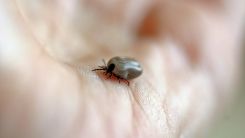Olive Marie

Does Your Dog Howl Each Time You Sing a Christmas Carol? There's an Instinctive Reason for It

Inflammatory Compounds in Cooked Meat Linked to Childhood Wheeze
Unique Discovery: 57-Year-Old Wolf Pup Mummy Preserved in Canadian Permafrost

Romantic Mistletoe? Science Disagrees
Researchers Explain How Colorado Potato Beetles Ward Off Pesticides

Facial Hair: Many People Have It, But What Are They For?

Body Clock Strongly Associated With High Risk of Alzheimer’s Disease

Humans Created More Than Half of the Hudson River Tidal Marshes Unintentionally
Early Humans May Have Survived Freezing Conditions by Hibernating

Scientists Share Important Information About the Quickly Spreading Coronavirus Variant in the UK
8 Remarkable Things About Spiders

Long-Term Impacts of Yelling at a Dog
Study Reveals a Surprising Similarity Between Bonobos and Humans

5 Ways to Reduce Your Christmas Tree’s Carbon Footprint

Curator Reveals How Some Australian Mammals are Glowing Under UV Light

Research Shows Link Between Big Brains and Autism

Upcycling Instead of Recycling: Turning Plastic Bags Into Adhesives

A Sneak Peek at Mars’ Inner Layers via NASA’s InSight Robotic Explorer
‘Sous Vide’ Way of Cooking Guarantees Easy-To-Digest Beef

Do You Expect Your Skin To Be Toxic To Ticks, but It’s Not? Here’s Why, According To Science

Kangaroos Use Unique Gaze to ‘Talk’ to Humans

Scientists Investigate Newly-Discovered Coronavirus Strain in the UK

Study Shows Link Between Loneliness and Changes in the Brain
Chinese Spacecraft Carrying Moon Rocks and Soil Safely Returns to Earth

Critical Temperature Rise Reduces Tropical Tree Lifespan
Robotic Submersibles to Watch Largest Iceberg Crash Into Island

Children By Age 3 Prefers Fractal Patterns of Nature

FDA Approves First-Ever at-Home COVID-19 Test With No Prescription Required

Report Identifies Chemical Plastics as a Global Health Threat
Most Popular

Can We Bring Back Extinct Animals? How De-Extinction Science and Technology Work

Why Do Stars Explode? Supernova Formation and the Final Stage of a Star Lifecycle

The Air Pollution Climate Link: What Environmental Science Reveals About Our Changing Planet

Extreme Heatwaves Explained: What Extreme Heat Science Reveals About Our Changing Climate




